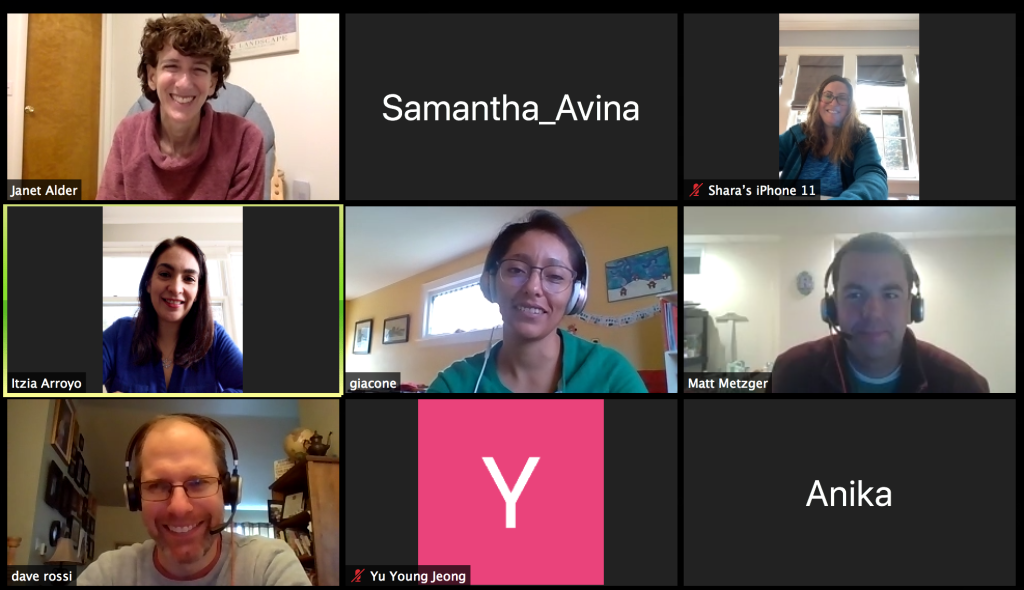By: Samantha Avina [caption id="attachment_3131" align="alignnone" width="660"] should I stay or should I go?
should I stay or should I go?
photo courtesy of Science Magazine 2019 Robert Neubecker[/caption] Ph.D. students are often unsure of what jobs “in industry” entail. More often than not transitioning from academia to industry work is kidded about as going to “the dark side” of research with an unknown agenda. However, what the jesting really masks is the lack of understanding that pertains to what happens on the other end of a critical component of a global research approach. Streamlining into industry research is frequently viewed as a daunting task with students unaware of how to market themselves or build networks that position them for diving into a thriving field that has become an increasingly advanced and rewarding career path. On April 7th, iJobs hosted a virtual career panel focused on Merck & Co. Pharmaceuticals that highlighted the variety of career possibilities within Merck and differences between academic vs industry research. The panel had a variety of Merck associated speakers that discussed a variety of topics Jumping Castle including: the job types at Merck, transitioning from academia to industry, and marketing yourself to stand out during the application process for potential employers like Merck. Additionally, panelists gave virtual attendees their perspectives on the current job market amidst the COVID-19 pandemic and how to focus on preparing for career advancement as a PhD candidate during this difficult time. The panel was comprised of five employees of Merck from different divisions of the Merck company at different stages of their career. David Rossi, an associate Principle Scientist, works on mechanical and particle engineering for tablet and capsule production with a focus on innovation for his team. David has been with Merck since 2007 after earning his degree in Chemical Engineering from John Hopkins University. David laid out the scope of Merck’s presence in the tristate area with locations in Rahway, Kensington, and WestPoint to name a few. Each campus location serves as a different branch of the Merck company including research development, manufacturing and supply, human health, animal health, and global support functions. He described the broad abundance of job opportunity at Merck that ranged from research on vaccine development and clinical trials, to regulatory writing and maintenance of Merck supply chain. The variety of panelists from these different divisions showed not only the vast potential career opportunities for Ph.D. holders, but the diversity of Merck employees who emphasized the reoccurring theme of Merck providing opportunities that were able to progress into solid career developments. For example, Dr. Francis Insaidoo who has been with Merck since 2013 shared how he became involved via the MRL postdoctoral Research Fellowship Program. The program aims to provide a post-doctoral experience in a commercial pharmaceutical setting that will prepare graduates with the tools, knowledge, and network they need to be successful. Of course, those who complete their post-doctorate degree at Merck have a high likelihood of a job offer in their Research and Development teams. Dr. Insaidoo works on biologics purification, specifically antibodies and proteins, and attributes the beginnings of his career as a scientist at Merck to enrolling in the MRL post-doc fellowship. [caption id="attachment_3130" align="alignnone" width="660"] Merck virtual career panelists with some students on zoom meeting[/caption] For others like Dr. Shara Dellatore, her journey of transitioning to industry started with coming to a crossroads of deciding what to do after attaining her Ph.D. in material engineering from Northwestern University that ultimately led to her scientific career starting at Merck. Dr. Dellatore who currently serves as director for Vaccine Immunogenicity, described her experience of starting as an associate principle scientist and working her way up to her current director position as a constant learning experience and a rewarding one at that.
Merck virtual career panelists with some students on zoom meeting[/caption] For others like Dr. Shara Dellatore, her journey of transitioning to industry started with coming to a crossroads of deciding what to do after attaining her Ph.D. in material engineering from Northwestern University that ultimately led to her scientific career starting at Merck. Dr. Dellatore who currently serves as director for Vaccine Immunogenicity, described her experience of starting as an associate principle scientist and working her way up to her current director position as a constant learning experience and a rewarding one at that.
"At first I wasn’t sure what I wanted to do. I felt like I had never been in industry setting and thought about having a career to be more connected to patients. Ultimately, seeing the next part of the research process was something that I could achieve through Merck"
“At first I wasn’t sure what I wanted to do. I felt like I had never been in industry setting and thought about having a career to be more connected to patients. Ultimately, seeing the next part of the research process was something that I could achieve through Merck”, Dr. Dellatore said about deciding to go into industry. Toward the end of the virtual panel she homed in on how working in industry differs from academia in your ability to work and communicate in a group setting to achieve a set goal. “While the science that you have done qualifies you, you need to convey your ability to work with and prepare for team and collaboration and problem solving”, she said in regard to working in industry. It was exciting to see a diverse group of panelists from Merck that came from different backgrounds while contributing greatly to the Merck teams. Danila Giacone, a Rutgers University Alumnus who has been with Merck for the past 8 years, is currently a senior scientist under the Analytical and Research Development Department. She described her journey as one of hard work with the ultimate intention of breaking into the industry field. Danila shared with the panel that she is a dreamer, and that although she does not hold a Ph.D. degree she was able to get her career going in this field by building on her biomedical engineering master’s degree background, accumulating fellowship experiences, and networking. When the panel began to discuss job prospects during the current pandemic, Danila was very open about how the hiring process is still very much ongoing and that current events should not hinder potential applicants from trying to get their foot in the industry door. “I post or share positions in my or my colleague’s department, we are hiring and there are positions out there”, Danila said about current job prospects during the COVID-19 lockdown.
Applicants can expect an interview day type of experience that involves a lot of interacting with different interviewers that can go into the late afternoon with dining and continuous use of people skills.
After the panel finished taking general questions facilitated by Dr. Janet Adler, the entire group was split into different “rooms” virtually where students were able to interact with panelists more one-on-one style. Many students had questions about the actual application process to a company like Merck and more specifics on difference between academic benchwork vs industry benchwork. The application process for Merck described by panelists had a similar structure to what many Rutgers students have experienced on recruitment day. Merck interviewers focus a lot on learning about applicants and how they would integrate into the team. Applicants can expect an interview day type of experience that involves a lot of interacting with different interviewers that can go into the late afternoon with dining and continuous use of people skills. Following the interview, generally the company will get back to you a few weeks later. Again, a similar approach to the Rutgers Ph.D. interview day.
“The pace is very different with many projects going on at once, so you wear different hats and attack things at different levels”
The general consensus amongst panelists on differences between academia and industry was that it depends on the role you play. “The pace is very different with many projects going on at once, so you wear different hats and attack things at different levels”, said Dr. Dellatore. Importantly, they concurred that the Ph.D. serves as the strong foundation for the skills needed to be successful in this field.
“Don’t let the current situation deter you from finishing, there is still a lot of work that needs to be done and there will continue to be openings, keep pushing forward and progressing to the end. Virtual interviews are still being conducted during this time!”
Students on the precipice of graduation asked questions about the job market during COVID-19. Panelists assured students that Merck is still very much hiring during this time and that scientists from all fields are in high demand. “Don’t let the current situation deter you from finishing, there is still a lot of work that needs to be done and there will continue to be openings, keep pushing forward and progressing to the end. Virtual interviews are still being conducted during this time!”, said Dr. Matt Metzger, a Rutgers Alumnus and current Merck Associate Principle Scientist. Additionally, students interested in getting an idea if industry would be a good fit for them were encouraged to apply for student internship opportunities offered by Merck. Furthermore, Rutgers has a summer internship partnership with Merck where students can see if industry is a good fit for them. In conclusion the iJobs virtual career panel with Merck was an informative and educational discussion amongst panelists and attendees who were interested in learning more about industry research. The panelists’ ability to discuss their own experiences of their careers in industry gave students a real perspective on the abundance of job types available in industry and a much better understanding of what industry work entails. In addition, career development experiences described by Merck employers highlighted the many opportunities Merck specifically provides provided for employees. Senior Editor: Helena Mello Junior Editor: Monal Mehta